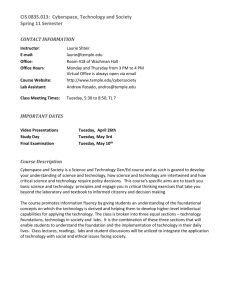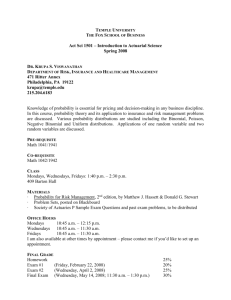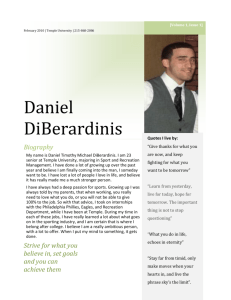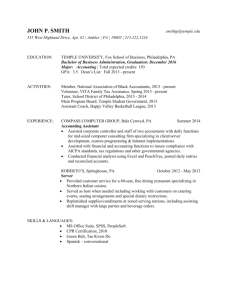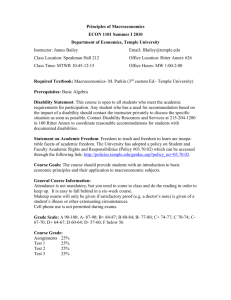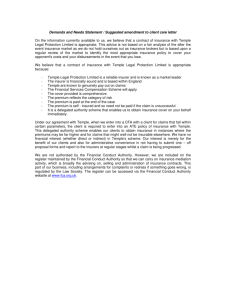Cyberspace - The Astro Home Page
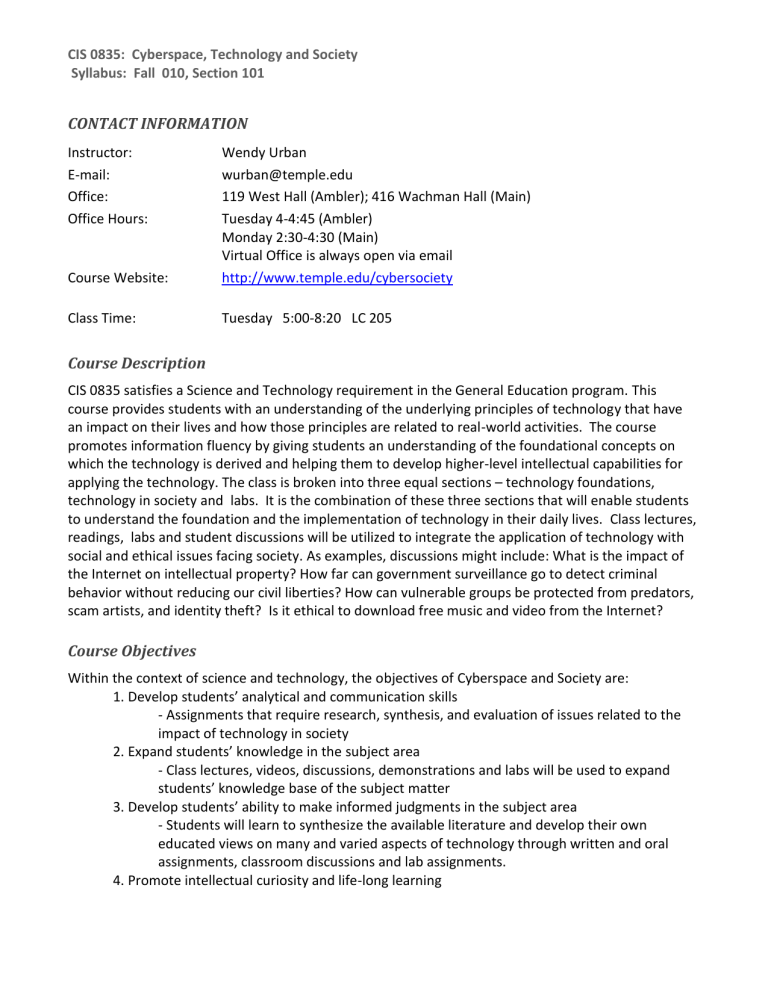
CIS 0835: Cyberspace, Technology and Society
Syllabus: Fall 010, Section 101
CONTACT INFORMATION
Instructor:
E-mail:
Office:
Office Hours:
Course Website:
Wendy Urban wurban@temple.edu
119 West Hall (Ambler); 416 Wachman Hall (Main)
Tuesday 4-4:45 (Ambler)
Monday 2:30-4:30 (Main)
Virtual Office is always open via email http://www.temple.edu/cybersociety
Tuesday 5:00-8:20 LC 205 Class Time:
Course Description
CIS 0835 satisfies a Science and Technology requirement in the General Education program. This course provides students with an understanding of the underlying principles of technology that have an impact on their lives and how those principles are related to real-world activities. The course promotes information fluency by giving students an understanding of the foundational concepts on which the technology is derived and helping them to develop higher-level intellectual capabilities for applying the technology. The class is broken into three equal sections – technology foundations, technology in society and labs. It is the combination of these three sections that will enable students to understand the foundation and the implementation of technology in their daily lives. Class lectures, readings, labs and student discussions will be utilized to integrate the application of technology with social and ethical issues facing society. As examples, discussions might include: What is the impact of the Internet on intellectual property? How far can government surveillance go to detect criminal behavior without reducing our civil liberties? How can vulnerable groups be protected from predators, scam artists, and identity theft? Is it ethical to download free music and video from the Internet?
Course Objectives
Within the context of science and technology, the objectives of Cyberspace and Society are:
1. Develop students’ analytical and communication skills
- Assignments that require research, synthesis, and evaluation of issues related to the impact of technology in society
2. Expand students’ knowledge in the subject area
- Class lectures, videos, discussions, demonstrations and labs will be used to expand students’ knowledge base of the subject matter
3. Develop students’ ability to make informed judgments in the subject area
- Students will learn to synthesize the available literature and develop their own educated views on many and varied aspects of technology through written and oral assignments, classroom discussions and lab assignments.
4. Promote intellectual curiosity and life-long learning
- Give students the background and the tools to enthusiastically support and encourage their curiosity and desire to learn more. The most obvious interactions in our students lives involves the Internet and the World Wide Web, and we will use this as an ongoing backdrop to understand the components of technology and to develop an intellectual interest and sophistication in understanding analyzing it and appreciating how this technology may change.
5. Develop skills in identifying, accessing, and evaluating sources of information
- Projects will help students develop the skills needed to approach and conduct research and make informed judgments based on that research. Students will be taught techniques for evaluating content and validity of information from various sources.
6. Develop ethics, citizenship, and awareness of current issues
- Each segment of the course will cover the societal and ethical implications of the technology
7. Promote collaborative learning and teamwork skills
- Group projects including but not limited to: debates and team research activities.
8. Develop an understanding of and appreciation for Temple’s urban setting and its regional and global connections
- Temple is one of the most connected/wired universities in the United States. This will provide students with a firsthand opportunity to learn, understand, and appreciate how technology can affect local and global communities.
9. Develop students’ ability to analyze and interpret data
Research, analysis and debate on issues involving technology and its application throughout society. Students will learn to analyze the ethical issues surrounding the technologies.
10. Develop students’ ability to identify and solve problems
- Students will identify a societal or ethical problem resulting from the use of technology. They will analyze the problem and formulate potential solutions with facts to back up solutions. The question may also be offered in reverse: Identify a societal or ethical issue or problem and discuss how technology can solve the problem.
Student Competencies
By the end of this course, students should be able to demonstrate the following competencies:
Understand hardware, software and other technologies utilized daily; in computers, the
Internet, home networks, and in mobile devices
Critical analysis of decisions made regarding the use of technology specifically in the social and ethical arenas
Understand the impact of current technologies, as well as the impact of emerging technologies both locally and globally
Website development (basic to intermediate skills) utilizing well-developed design techniques.
Evaluate and compare options when purchasing a personal computer
Understand how computer systems are used in society
Ability to make informed choice while using the Internet by understanding and evaluating security and privacy issues.
Ability to analyze the positive and negative implications of current technologies
Develop and refine presentation, analytical, problem solving and writing skills
REQUIRED MATERIALS
1 USB Flash Drive – at least 256 megabytes.
The following recommended book is available at the Temple University Book Store. The Pearson
Custom Program for CIS 0835. We will use web resources for the “current societal” topics.
COMMUNICATION OUTSIDE OF CLASS
My office hours and email are listed above. Email is typically the easiest way to reach me outside of class or my office hours. You need to check Blackboard and your Temple email regularly during the semester. If you do not use Temple’s email system, make sure that you forward your Temple emails to whichever one you do use.
GRADES
Grades will be assigned as follows:
4 Quizzes 23 points each
Website
Group Video
Technology in Society Assignments
(5 assigned-you only need to do 4 of them)
6 points each
2 Labs (PC Configuration, Network Scavenger Hunt) 10 points each
Technology in the Sciences Paper
Course Project/Debate/Wiki
Final Exam
Class Participation
TOTAL
Cumulative
92 points
60 points
30 points
24 points
20 points
15 points
58 points
85 points
16 points
400 points
COURSE POLICIES
There are no makeup quizzes (or exams) unless there are unusual and unavoidable circumstances that I believe warrant a retake and for which you can provide me with documentation (dr. note, etc). If you are not present when the quiz is distributed (late/absent/whatever) you will receive a 0 for that quiz.
Unless other instructions are given, all labs are due at the beginning of class one week after they were assigned.
Blogs are due by 9am the day the topics will be discussed in class. No late submissions.
Students with special needs: Any student who has a need for accommodation based on the impact of a disability should contact me privately to discuss the specific situation as soon as possible. You should also contact Disability Resources and Services at 215-204-1280 in 100 Ritter Annex.
The University has adopted a policy on Student and Faculty Academic Rights and Responsibilities
(Policy # 03.70.02) which can be accessed through the following link: http://policies.temple.edu/getdoc.asp?policy_no=03.70.02
Cell phones MUST be turned off in my class.
You will be responsible for research on various topics. Wikipedia, webopedia and other similar sites are NOT acceptable sources of information for this course.
ATTENDANCE/PARTICIPATION
Attending classes is critical for you to be successful in this course. This is a discussion-oriented course.
Part of the “class participation” portion of your grade is at my discretion and includes your attendance.
Class participation is integral for this class to be effective.
ORIGINALITY OF WORK and CITING OF SOURCES
Do not cheat in this class. I take this very seriously as does the university!! This includes plagiarism. If you quote someone else’s material, you MUST cite it properly. This includes all material taken from the Internet. If you copy work from the Internet or another source, and do not cite it properly, you will fail this course. All of your work must be your own…this includes your lab assignments.
Students should also be familiar with the University statement on academic honesty found at the following link: http://www.temple.edu/bulletin/Responsibilities_rights/responsibilities/responsibilities.shtm.
I also expect you to understand and utilize the proper way to cite sources and utilize reference materials. There are many sites for proper APA or MLA citing – either is acceptable for this class. If you are not familiar with how to do this, you can get useful information from the Temple Writing Center or at: http://www.temple.edu/writingctr/handouts/citationguides/index.html
I will also post information on Blackboard to help guide you.
WITHDRAWAL POLICY
Students may withdraw at any time as long as it meets university guidelines.
FINAL GRADES
Final grades will be assigned as follows. Your grade equals your total points / 400 available points
Percentage
C-
D
D-
F
B
B-
C+
C
Final
Grade
A
A-
B+
Total
Points
368-400
360-367
352-359
328-351
320-327
312-319
288-311
280-287
248-279
240-247
0-239
92-100
90-91
88-89
82-87
80-81
78-79
72-77
70-71
62-69
60-61
0-59
SEMESTER SCHEDULE
This schedule is subject to change throughout the semester. Changes will be communicated in class and through Blackboard.
9/21:
9/28:
8/31: Course Introduction
Our Digital Planet (Chapter 1)
Introduction to Blogs and Sources
“Technology in Society” #1 Assigned
9/7: The Evolving Internet (Chapter 9)
Technology in Society Assignment 1 Due
Video Project Assigned
9/14: Networking and Digital Communications (Chapter 8)
Technology in Society Assignment 2 Due
Lab: Network Scavenger Hunt
Quiz 1
Video Project Work Time
Lab: Client/Server Configuration Web Design Architecture (Websites #1)
Flash Drives are Needed Starting TODAY.
Computer Security and Risks (Chapter 10)
Video Projects Due and Presented
Lab: Web Design Architecture Interactive Web Components (Websites #2)
10/5: Technology in Society Assignment 3 Due
Software (Chapter 4)
Lab: Interactive Web Components (Websites #3)
10/12: Hardware – part 1 (Chapter 2)
Quiz 2
Lab: Digital Image Manipulation (Websites #4)
10/19: Hardware – part 2 (Chapter 3)
Technology in Society Assignment 4 Due
Lab: Javascript (Websites #5)
10/26: Productivity Applications (Chapter 5)
Lab: Web Design Putting it all together (Websites #6)
WEBSITES DUE AT 5pm on Wednesday, 10/27
11/2: Quiz 3
Graphics and Multimedia (Chapter 6)
Debate/Wiki Project Assigned
Lab: Numerical Analysis Part I
11/9: Databases (Chapter 7) and E-Commerce (Chapter 11)
Technology in the Sciences – written paper due
Lab: Numerical Analysis Part 11
11/16: Quiz 4
Lab: PC Configuration Lab
NO CLASS – Calendar Adjustment Day 11/23:
11/30: Debates
Technology in Society Assignment #5 Due
Lab: Google Docs
12/7: Debates
FINAL EXAM: Tuesday, December 14 th 5:45-7:45pm
